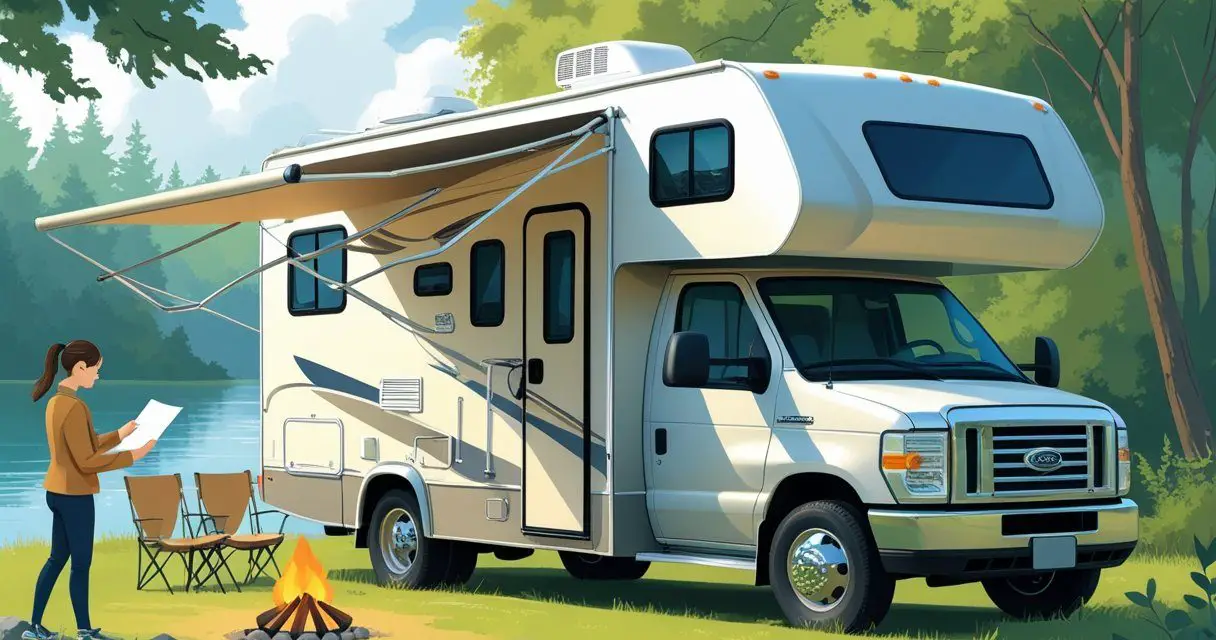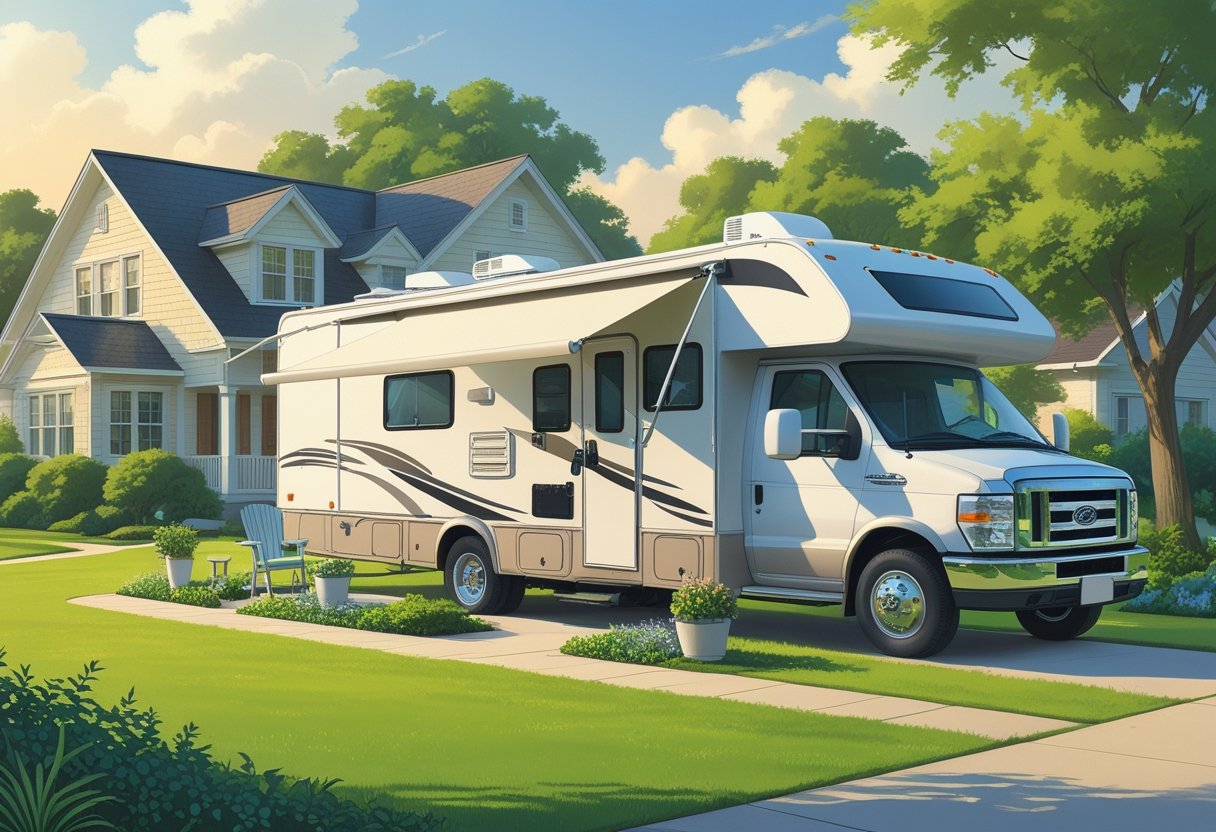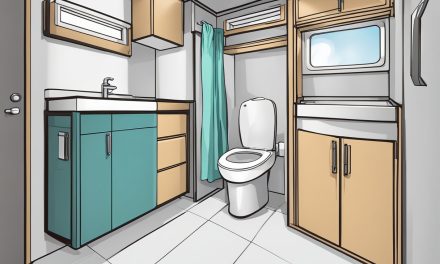If you’re dreaming of hitting the road in an RV while also scoring some tax benefits, you might be wondering whether your recreational vehicle can actually count as a second home. Yes, your RV can qualify as a second home for tax purposes if it has sleeping, cooking, and toilet facilities according to IRS guidelines. This classification opens up potential deductions that could help offset the costs of your mobile adventures.
Would you like to save this article?
The tax landscape for RVs has shifted significantly in recent years, making it more complex than simply buying any recreational vehicle and claiming deductions. Understanding the specific requirements and limitations can help you make informed decisions about your purchase and potentially save money on your taxes.
Whether you’re considering an RV as an alternative to a traditional vacation home or just want to maximize the financial benefits of your investment, knowing how these rules work will help you navigate the process more effectively.
Key Takeaways
- RVs with sleeping, cooking, and toilet facilities can qualify as second homes under IRS rules
- Tax deductions for RV mortgage interest are limited by current laws and may require itemizing deductions
- Consulting a tax professional is recommended to understand how RV ownership affects your specific tax situation
What Does It Mean for an RV to Qualify as a Second Home?
When your RV qualifies as a second home, you can claim mortgage interest deductions and property tax benefits similar to a traditional vacation home. The IRS has specific facility requirements that determine eligibility, and different types of recreational vehicles may qualify differently based on their amenities and setup.
Key Requirements According to the IRS
The IRS requires your RV to have three essential facilities to qualify as a second home. Your recreational vehicle must include sleeping, cooking, and toilet facilities all within the same unit.
The sleeping area can be a permanent bed, convertible dinette, or any designated space for rest. Your cooking facility needs a stove, cooktop, or other permanent cooking equipment – a microwave alone typically doesn’t qualify.
The toilet requirement means a functional bathroom with plumbing. Portable camping toilets or cassette systems may not meet IRS standards depending on their installation and functionality.
All three facilities must be built into the RV itself. External attachments like portable grills or separate bathroom facilities don’t count toward qualification.
Your RV also needs to be used as a dwelling, not just storage or transportation. The IRS expects reasonable personal use of the vehicle as living space.
Differences Between RVs, Travel Trailers, and Other Dwellings
Motorhomes typically qualify most easily since they’re self-contained units with integrated systems. Class A, B, and C motorhomes usually include all required facilities in one cohesive living space.
Travel trailers and fifth wheels can qualify if they contain the three required facilities. Size doesn’t matter – even smaller trailers may qualify if properly equipped.
Truck campers often qualify when they include complete kitchen and bathroom facilities. Pop-up campers rarely qualify due to limited permanent facilities.
Toy haulers can qualify if the living area includes all required amenities separate from the cargo space. The IRS focuses on the dwelling portion, not storage areas.
Traditional vacation homes have permanent foundations and utilities. RVs differ because they’re mobile and may rely on hookups or self-contained systems for water, electricity, and waste management.
Common Misconceptions About RV Eligibility
Many people believe expensive RVs automatically qualify as second homes. Price doesn’t determine eligibility – only the presence of required facilities matters.
You don’t need to park your RV on owned land for it to qualify. RVs can qualify whether parked at RV parks, campgrounds, or private property.
Frequent movement isn’t required or prohibited. Your RV can remain stationary and still qualify as a second home if it meets facility requirements.
Some assume only large RVs qualify, but size doesn’t matter to the IRS. A small travel trailer with proper facilities can qualify over a large motorhome without them.
Many think RV loans automatically qualify for mortgage interest deductions. The loan terms don’t determine tax treatment – only whether your RV meets IRS dwelling requirements.
Business use doesn’t disqualify your RV from second home status, but it may affect your deduction calculations and require additional tax considerations.
IRS Rules and Criteria for Second Home Status
The IRS has specific requirements that determine whether your RV qualifies as a second home for tax purposes. These rules focus on basic living facilities, how you use the vehicle, and maintaining proper documentation.
Essential Facilities Needed: Sleeping, Cooking, and Toilets
Your RV must contain three basic living facilities to qualify as a second home under IRS guidelines. These include sleeping accommodations, cooking facilities, and toilet facilities.
The sleeping area doesn’t need to be a separate bedroom. A convertible dinette or murphy bed satisfies this requirement. Your RV’s kitchen must have basic cooking equipment like a stove, oven, or microwave.
The toilet facility can be a traditional RV bathroom or a portable toilet system. All three facilities must be permanently installed or built into the RV structure.
Travel trailers, fifth wheels, and motorhomes typically meet these requirements. Pop-up campers and tent trailers may qualify if they have permanent cooking and toilet facilities.
Ownership and Usage Rules
You must own the recreational vehicle to claim it as a second home. Leased or rented RVs don’t qualify for second home tax benefits.
The IRS doesn’t require your RV to remain stationary. You can move it between campgrounds and still maintain second home status. However, you must use it as a residence rather than just recreation.
Your RV can be your primary residence if you live in it full-time. Many full-time RVers claim their recreational vehicle as their main home for tax purposes.
There’s no minimum usage requirement, but you should maintain records showing residential use. The IRS may question claims if you never actually occupy the RV.
Record-Keeping and Documentation
Maintain detailed records of your RV’s purchase price, improvements, and usage. Keep receipts for mortgage interest, property taxes, and maintenance expenses.
Document where you park your RV and for how long. Campground receipts and registration records help prove residential use. If you rent out your RV, track rental income and expenses separately.
Your RV’s title and registration should list you as the owner. Insurance policies showing the vehicle as a residence rather than recreation strengthen your claim.
Keep photographs showing the RV’s living facilities and any improvements you make. The IRS may request this documentation during an audit.
Tax Deduction Opportunities and Limitations
When you own an RV that qualifies as a second home, you can access certain tax deductions including mortgage interest deductions up to specific limits. The Tax Cuts and Jobs Act has introduced caps on these benefits, and property tax deductions are also subject to state and local tax limitations.
Mortgage Interest Deduction for RVs
You can deduct mortgage interest on your RV if it qualifies as a second home with sleeping, cooking, and toilet facilities. The IRS treats qualified RVs the same as traditional second homes for tax purposes.
Current deduction limits include:
- $750,000 for married filing jointly, single, or head of household taxpayers
- $375,000 for married filing separately
Your total mortgage debt on both your primary home and RV cannot exceed these amounts to qualify for the full deduction. If your primary home mortgage is already near the limit, your RV mortgage interest may not be deductible.
You must itemize deductions to claim this benefit. Many taxpayers now take the standard deduction instead because it’s higher than their itemized deductions combined.
Limits Set by the Tax Cuts and Jobs Act
The Tax Cuts and Jobs Act significantly changed how you can deduct expenses related to your RV. These changes reduced the tax benefits compared to previous years.
The act eliminated personal exemptions and increased the standard deduction. This means fewer people have enough deductions to make itemizing worthwhile.
Key changes include:
- Lower mortgage interest deduction limits
- Elimination of miscellaneous itemized deductions
- Higher standard deduction amounts
Before purchasing an RV, add up your potential deductions. Include mortgage interest from both homes, state and local taxes, and charitable contributions to see if itemizing makes sense.
These provisions expire at the end of 2025 unless Congress extends them. The rules may change again depending on future legislation.
Property and Sales Tax Considerations
You can deduct property taxes on your RV, but they’re subject to the state and local tax (SALT) deduction cap. This limitation significantly affects your overall tax benefits.
SALT deduction limits:
- $10,000 for married filing jointly
- $5,000 for married filing separately or single taxpayers
If you already reach the SALT cap with your primary residence property taxes and state income taxes, additional RV property taxes won’t provide extra deductions.
Sales tax on your RV purchase can also count toward the SALT deduction if you choose to deduct sales taxes instead of state income taxes. You can’t deduct both in the same year.
The SALT limitation particularly impacts taxpayers in high-tax states. Your RV property taxes compete with other state and local taxes for the limited deduction space.
RVs Versus Other Second Home Alternatives
When considering a second dwelling, you’ll find RVs compete with ADUs and traditional housing options, each offering distinct advantages for affordability and legal compliance. Local zoning laws significantly impact which alternative works best for your property and budget.
Accessory Dwelling Units (ADUs) Compared to RVs
ADUs are permanent secondary dwelling units built on the same property as your main home. They can be attached or detached structures that typically offer more space than RVs.
Size and Space Differences:
- ADUs: No size restrictions in most areas, often 600-1,200 square feet
- RVs: Limited to 400 square feet maximum when set up
Cost Considerations: Building an ADU costs $100,000-$300,000 depending on your location and design. RVs range from $20,000-$150,000 for quality units.
You’ll need building permits for ADUs, which involves architectural plans and inspections. RVs require state vehicle licensing but simpler permitting for placement.
ADUs increase your property value permanently. RVs depreciate over time but offer mobility if you want to relocate your second dwelling.
RV and Travel Trailer as Affordable Housing Options
RVs and travel trailers provide budget-friendly alternatives to traditional second homes. You can find quality used travel trailers for $15,000-$40,000.
Immediate Affordability Benefits:
- Lower upfront costs than building
- Reduced property taxes
- Minimal utility connection expenses
Travel trailers offer the most affordable entry point into RV living. They require a towing vehicle but cost significantly less than motorhomes.
Ongoing Expenses: You’ll pay for RV insurance, maintenance, and potential storage fees. These costs stay lower than traditional home ownership expenses.
Housing Flexibility: RVs work well for seasonal use or temporary housing needs. You can move them between properties or sell them more easily than permanent structures.
Legal and Zoning Implications for Secondary Dwellings
Zoning laws determine where you can place RVs as second dwellings. Many jurisdictions now allow RVs on residential properties with specific requirements.
Current Legal Framework:
- RVs permitted on single-family residential lots in many areas
- Must be located in unincorporated county areas (outside cities)
- Properties inside urban growth boundaries or outside urban reserves qualify
Permit Requirements: You need proper permits before placing an RV as a second dwelling. Contact your local planning department to verify property eligibility.
Compliance Standards: RVs must maintain state vehicle licensing and meet local setback requirements. Some areas require utility connections or septic system access.
ADU Regulations: ADUs in rural areas became legal in many states after 2021-2023 legislation changes. They require building permits and must meet residential building codes.
Practical Scenarios and Considerations
Different RV usage patterns create unique tax and legal situations. Full-time living, rental income, and business use each have specific requirements that affect second home qualification.
Living Full-Time in an RV: Legal and Tax Implications
Full-time RV living can complicate second home tax benefits. The IRS requires you to have a primary residence to claim a second home deduction.
If your RV becomes your only home, it shifts from second home to primary residence status. You lose the second home mortgage interest deduction but gain the primary residence benefits.
Key requirements for full-time RV living:
- Established permanent address for legal purposes
- State residency documentation
- Proper insurance coverage for full-time occupancy
You need to maintain detailed records of where you park and how long you stay. Some states require minimum presence for tax residency.
A tax professional can help navigate the complexities of changing residence status. They ensure you comply with both federal and state requirements.
Renting Out Your RV as a Second Home
Renting your RV changes its tax classification significantly. Income from RV rentals must be reported on Schedule E.
You can deduct expenses like:
- Maintenance and repairs
- Insurance premiums
- Depreciation
- Storage fees
The IRS applies the 14-day rule for rental properties. If you rent for more than 14 days annually, you must report all rental income.
Personal use affects deductions. If you use the RV for 10% of the year, you can only deduct 90% of expenses against rental income.
Keep detailed logs of rental days versus personal use days. This documentation proves your deduction calculations to the IRS.
Business Use Versus Personal Use
Business use of your RV eliminates second home tax benefits. The IRS requires you to choose between personal and business classifications.
Business use includes:
- Mobile office operations
- Traveling for work purposes
- Client entertainment venues
You can claim Section 179 depreciation for business RVs. This allows immediate deduction of the full purchase price in many cases.
Mixed-use situations require careful documentation. You must allocate expenses between business and personal use based on actual time spent.
The IRS scrutinizes luxury items like RVs for business use. You need legitimate business purposes and proper record-keeping to support your claims.
When to Consult a Tax Professional
RV tax situations can become complex quickly, especially when dealing with unique ownership arrangements or business use. Tax laws affecting second homes and recreational vehicles continue to evolve, making professional guidance valuable for maximizing benefits and staying compliant.
Navigating Unique RV Ownership Situations
You should consult a tax professional when your RV ownership involves multiple uses or complex arrangements. The IRS scrutinizes business deductions related to mobile offices, so you need expert guidance if you use your RV for work purposes.
Business use scenarios require careful documentation and understanding of specific rules. If you operate a mobile business from your RV or use it to travel to job sites, a tax professional can help you properly deduct expenses while avoiding audit triggers.
Rental income situations become complicated when you rent your RV for more than 14 days annually. You’ll need to understand passive loss rules and how they limit deductions against other income sources.
Multiple state residency issues arise when you travel extensively. If you stay in one state over 183 days, statutory residency income tax rules may apply, creating unexpected tax obligations.
Planning for Potential Tax Law Changes
The Tax Cuts and Jobs Act provisions affecting second home mortgage interest deductions expire at the end of 2025. You should consult a tax professional to understand how these changes might impact your RV as a second home.
Current limitations on mortgage interest deductions and SALT deductions may change significantly. A tax professional can help you plan for different scenarios and timing strategies.
State-specific regulations vary widely and continue evolving. Some states are cracking down on tax avoidance strategies, making professional guidance essential for compliance.
Future purchase planning benefits from professional input on structuring your RV ownership to maximize tax advantages under both current and potential future tax laws.









